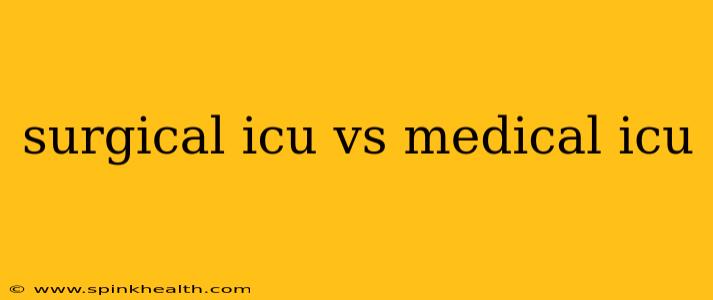Surgical ICU vs. Medical ICU: Understanding the Differences
The rhythmic beeping of heart monitors, the hushed urgency of nurses, the constant flow of information – these are the hallmarks of any Intensive Care Unit (ICU). But within the ICU world, there's a crucial distinction: the Surgical ICU (SICU) and the Medical ICU (MICU). While both provide critical care, their focus and the types of patients they treat differ significantly. Let's delve into the world of these specialized units, unraveling their unique characteristics and revealing how they serve critically ill patients.
Imagine two scenarios: A patient recovering from a complex heart surgery, their body still grappling with the trauma of the procedure. Then, picture a patient battling a severe pneumonia, their lungs fighting for every breath. The first patient finds solace in the SICU, the second in the MICU. This illustrates the fundamental difference: the type of illness requiring critical care.
What is a Surgical ICU (SICU)?
The SICU is specifically designed for patients recovering from major surgical procedures. These patients often require close monitoring for complications like post-operative bleeding, infection, or organ dysfunction. Think open-heart surgery, major trauma, organ transplants – these patients need the specialized care a SICU offers.
The SICU team is highly skilled in managing:
- Post-operative bleeding and shock: Surgical interventions often disrupt blood vessels, leading to potential complications. The SICU team expertly manages these situations.
- Wound care: Monitoring surgical incisions for infection and providing advanced wound care is a critical aspect of SICU care.
- Pain management: Post-operative pain can be severe. SICU nurses and doctors employ advanced pain management techniques to ensure patient comfort and recovery.
- Mechanical ventilation: Many post-surgical patients require assistance with breathing, and the SICU team provides this crucial support.
What is a Medical ICU (MICU)?
The MICU, in contrast, focuses on patients with severe medical illnesses that require close monitoring and intensive support. These patients may be battling life-threatening conditions such as:
- Severe respiratory failure (pneumonia, ARDS): Patients needing mechanical ventilation and other respiratory support are frequently admitted to the MICU.
- Sepsis: A life-threatening condition caused by the body's overwhelming response to an infection.
- Acute kidney injury: Requiring dialysis and careful fluid management.
- Heart failure: Patients experiencing severe heart failure often need advanced circulatory support.
- Stroke: Patients suffering from severe strokes need intensive neurological monitoring and treatment.
The MICU team possesses expertise in:
- Respiratory support: Managing patients with severe lung conditions requiring mechanical ventilation and other advanced techniques.
- Hemodynamic monitoring: Closely monitoring blood pressure, heart rate, and other vital signs to ensure circulatory stability.
- Infectious disease management: Treating severe infections and managing antibiotic therapy.
- Neurological monitoring: Closely observing patients with neurological conditions, such as stroke or brain injury.
What are the key differences between a Surgical ICU and a Medical ICU?
While both units provide critical care, their focus is distinctly different:
| Feature | Surgical ICU (SICU) | Medical ICU (MICU) |
|---|---|---|
| Primary Focus | Post-surgical complications & recovery | Severe medical illnesses |
| Patient Type | Patients recovering from major surgery | Patients with life-threatening medical conditions |
| Common Issues | Bleeding, infection, pain, respiratory issues | Respiratory failure, sepsis, heart failure, stroke |
| Specialized Care | Wound care, pain management, post-op complications | Respiratory support, hemodynamic monitoring, infection control |
What type of ICU would I need?
The decision of which ICU is best suited for a patient is made by the attending physician based on their specific medical condition and needs. Factors such as the severity of illness, the need for specific procedures or support, and the potential for post-operative complications all play a crucial role.
How are the staff different in Surgical vs. Medical ICUs?
While both units are staffed by highly trained critical care professionals, there are differences in their specialization. The SICU staff have advanced knowledge of surgical procedures and post-operative care, while the MICU staff have deep expertise in managing acute medical conditions. However, both teams possess a deep understanding of critical care principles and work collaboratively to ensure the best possible outcomes for their patients.
This distinction between SICUs and MICUs is not just a matter of labeling; it reflects a fundamental difference in the expertise and resources required to care for patients with drastically different medical needs. Both play a vital role in ensuring the best possible outcomes for critically ill individuals.

